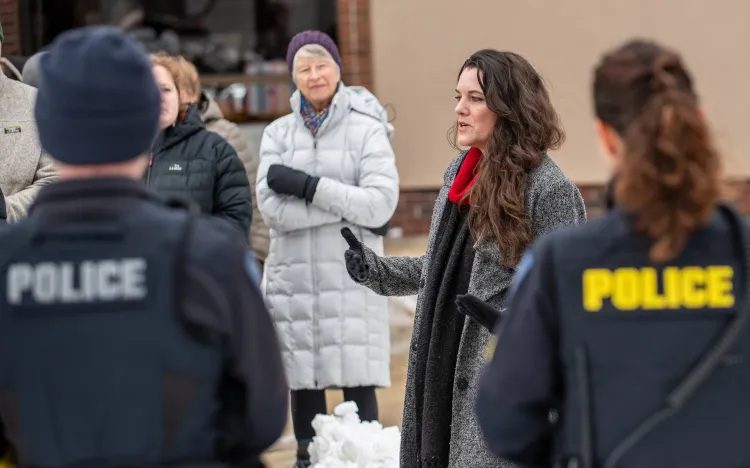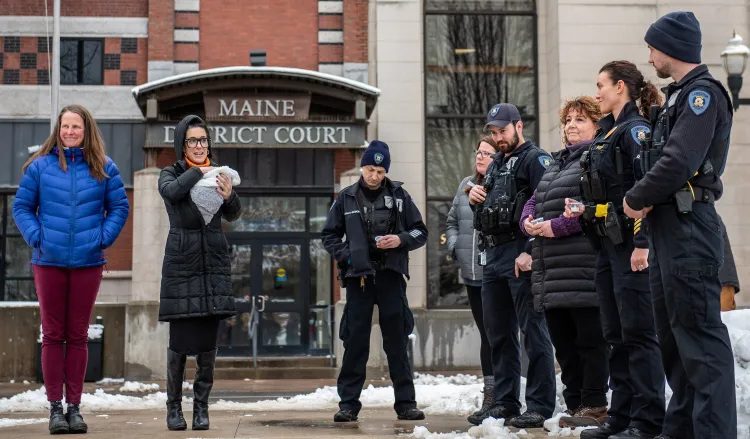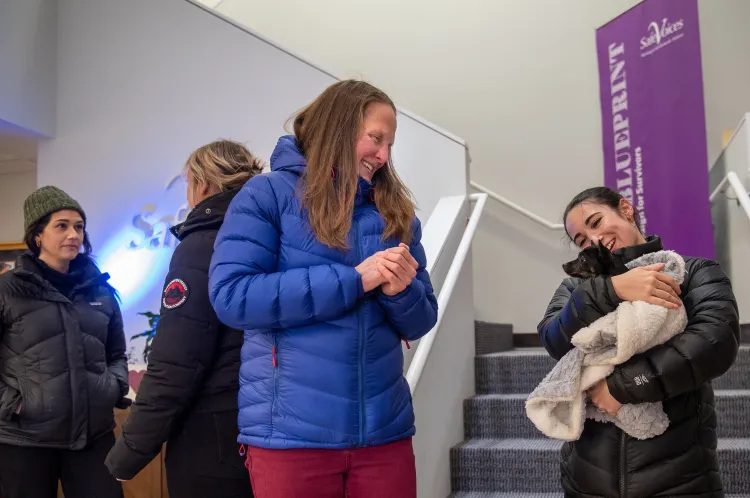Advocates hold vigil for victims of human trafficking in Lewiston
Local advocacy groups for victims of human trafficking and sexual violence held a vigil Monday in Dufresne Plaza to honor those lost due to trafficking and to show the importance advocacy has in a victim’s life.
By Joe Charpentier
On January 29, 2024

LEWISTON — Human Trafficking Prevention Month brought local advocates and the community out Monday to honor those who have died due to human trafficking.
Safe Voices Executive Director Elise Johansen, the Lewiston office staff and advocates were flanked by representatives from other organizations in Dufresne Plaza on Lisbon Street. Among attendees were Meg Hatch, executive director of Sexual Assault Prevention and Response Services in Waterville, and Tricia Grant of Westbrook Just Love Worldwide. Nathan Walsh, assistant district attorney for Androscoggin County, local law enforcement officers and others also attended to show solidarity and support.
Johansen said the vigil is about more than honoring victims — it’s also about recognizing the efforts communities are making in fighting human trafficking.

“All of us are here today to acknowledge human trafficking happens in our community,” she said. “The fact there’s a (national) awareness month … is also an acknowledgement that it happens here, it’s happening everywhere and collectively we need to come together to stop this from happening in our community… Oftentimes people say, ‘oh, it’s the world’s oldest profession. There are no victims,’” she said. “We say it’s the world’s oldest oppression, that we live in a world where people think it’s OK to buy and sell another person. We say it’s not OK.”
Organizations such as those led by Johansen, Hatch and Grant are constantly working together to ensure victims of trafficking, domestic violence and sexual abuse get the resources they need in the places they are at, Hatch said. They work with local law enforcement, district attorneys’ offices and community members to find creative ways to find those who need help and to encourage them to take advantage of those resources.
Grant, a survivor of trafficking that began at age 15, said she did not know what was happening to her for 16 years, that it had a name and that none of it was her fault until she found an advocate of her own.
“I don’t want other survivors to feel like they have to be silent like I was,” Grant said. “We’re not anywhere close to where we want to be, but we’re getting there … We need advocates, we need people on our sides. We also need to collaborate with survivor leaders in this work because it takes all of us to get it done.”
Nathan Walsh, assistant district attorney for Androscoggin County, serves as his district’s human trafficking prosecutor. He said while the problem is very real for Androscoggin County, advocates, law enforcement and his office have made significant progress in deterring human trafficking.

“(We) see trafficking for what it is … the commercial sexual exploitation of some of the most vulnerable members of our community who have had to make very difficult choices on how to survive,” Walsh said. “You get these situations where you have people buying people who have nothing else but themselves to sell.”
Walsh said efforts for combating human trafficking are being focused on diminishing the demand for it. Success in bringing down human traffickers have come mostly from law enforcement sting operations, organizations including Safe Voices and SAPRS and advocates in the District Attorney’s Office. By seeing more and more cases coming into his office, he and others working against human trafficking are witnessing good work being done.
“If we were getting no cases, then we’d know that we’re just not addressing the problem,” Walsh said. “You can look at the folks here getting people through the door and if we’re not getting cases brought to us, it shows there’s a gap. So, yeah, it is good to know that law enforcement is identifying (trafficking), but it’s also depressing to see the breadth of the issue.”
Maine’s recent decriminalization of sex-selling while keeping sex-buying illegal has helped in anti-trafficking efforts in that law enforcement is “going after the right people,” Walsh said.
However, the decrease in Victims of Crime Act funds from the federal government has left Maine and other states picking up the costs of keeping several advocacy programs like Safe Voices open. Walsh said Safe Voices’ safe house is run on some of those funds and closing it would leave victims at risk of violence unprotected from their abusers.
“It would be devastating because the heart of our funding comes from (Victims of Crime Act funds),” Jessica Kennagh, victim witness advocate for the District Attorney’s Office in Androscoggin County, said. In fact, most of Maine’s anti-trafficking funds, court advocates or organizations like Safe Voices, come from Victims of Crime Act funds, she said. If that money does go away, anti-trafficking efforts across Maine will greatly diminish.
“People don’t think things like this happen,” Grant of Just Love Worldwide said.
As for the vigil, she said, “I think it’s a time to reflect on the collaboration in the community partnerships we have and figuring out creative ways to identify folks who may be struggling and how to get them connected with the things they might need.”
This piece was republished from the Sun Journal.